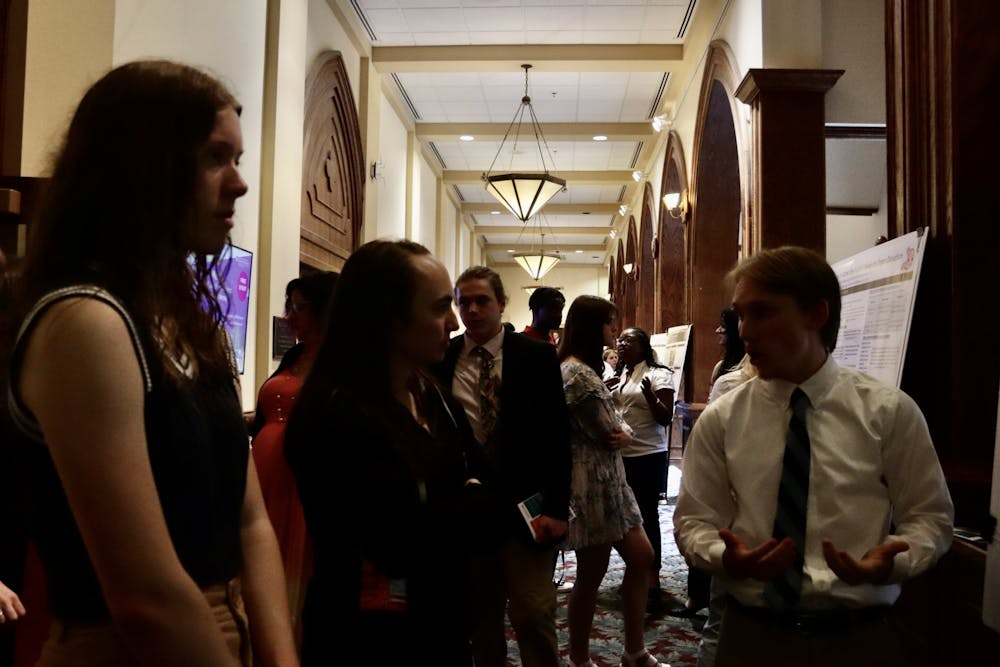The University of Richmond’s School of Arts & Sciences hosted its 38th annual student symposium Friday, showcasing a culmination of students’ research and learning from last summer through this school year.
The day full of events began with the Honors Convocation, a ceremony highlighting and recognizing the achievements of students and their work. Live performances were accompanied by introductions and speeches given by students who won awards.
Student presentations began at 12:30 p.m. in different locations across campus. The symposium was broken up into three types of presentations; art exhibits and performances, oral presentations and poster sessions.
Mckennah Lauber, a senior studying psychology, researched whether diversity, equity and inclusion initiatives on college campuses improve feelings of belonging for students of color, they said.
Lauber’s study showed that students of color felt that they belonged less than their white peers. The DEI initiatives were broken into categories of belonging, motivation, benefit, success and effort, and students of color reported most of these categories lower than white students, Lauber said.
Lauber also looked into the perceived motivations of a university implementing DEI initiatives, and how negative perceptions of motivation negatively impacted belonging in students of color. When motivations were perceived as positive, feelings of belonging increased, they said.
“I hope they realize how it’s not just about the presence of these initiatives on campus,” Lauber said. “We actually have to make sure that what we’re saying matches what we’re doing and that people do pick up on the perceptions behind these like the motivations.”
Senior Jocelyn Hernandez explored culture and identity through the creation of several art pieces titled “The Unforgiving American”. Their pieces included three sculptures of the word America in metal hung on the wall and showed a video of Hernandez stepping on the words and a series of prints.
“Through my bi-culture identities, I experience America through my parents’ American dream,” Hernandez said. “Influenced by construction, my family’s business, we are quite literally building this country’s entrepreneurs while simultaneously facing institutions that are not made for us.”
Hernandez describes sculpting the word America as a metaphor for immigrants building the country. By them stepping on the sculpted America, they are destroying the ideas that perpetuate racism, Hernandez said.
Hernandez also presented prints featuring words from the U.S Constitution fading out and the Statue of Liberty toppled over.
“I question America by questioning what is America, who is American, and what is the American dream and who is it for?” Hernandez said. “And through that I question, as Americans, do we have life, do we have liberty, and do we have the pursuit of happiness? And I argue that all we do have is the pursuit, which is killing us slowly.”
Enjoy what you're reading?
Signup for our newsletter
Moriam Animashaun, a sophomore majoring in biochemistry, researched epilepsy in zebrafish. Animashaun studied the genes connected to epilepsy in zebrafish and compared them to wild zebrafish, also analyzing and comparing the behaviors in both. Animashaun said they wanted the community to gain a deeper understanding of epilepsy from their work.
“It affects so many people,” Animashaun said. “I feel like it should be more talked about and we should all be doing our part and trying to help people with this type of disorder.”
The future goal of Animashaun’s study is to further investigate epilepsy in zebrafish. Having a better understanding of epilepsy through continued research may lead to learning more about autism because there’s a connection between the two, Animashaun said.
Peterson Haas, a sophomore double majoring in biochemistry and mathematical economics, researched the mechanisms that could drive the initiation and progression of prostate cancer. Haas explored this in mice over the summer at UCLA, they said.
“Prostate cancer, specifically, is the most common cancer in men worldwide,” Haas said. “It's important to have an overview of the current treatments we have and also some preventions for that.”
One of the biggest outcomes Haas observed was reprogramming cells being more sensitive to treatments. Being able to identify more mechanisms that can establish the differentiation of specific cells can improve their research and treatments of cancer, Haas said.
Sophomore Rizza Mojados researched how white supremacy impacted Black and Asian alliances.
“I talk about how white supremacy is a divisive agenda that pits people of color against each other as a way to distract them from the real issue of white supremacy,” Mojados said.
The model minority myth is when Asian Americans are perceived to be the better minorities because of stereotypes of having high-paying jobs and being hard working, Mojados said.
“It’s a false narrative that completely erases the structural barriers that Asian Americans have gone through with xenophobia, language barriers, as well as poverty,” Mojados said. “It reinforces the myth that Asian Americans are the better minority group and it pits other minorities against Asian Americans because they believe that the model minority myth.”
Mojados said they felt this is a relevant issue to look into with the rise of the BLM movement and the Stop Asian Hate movement. When asked about the future, Mojados sees it leading to more discussions between marginalized groups. People need to do their research and gain a better understanding of the true source of the issue, Mojados said.
The symposium showcased different works done by students and emphasized the array of learning done at UR. From studies measuring social and societal structures to more scientific research that leads to a better understanding of biological functions, the students have made an impact through their research and art this year.
Contact news writer Alexa Mora at alexa.mora@richmond.edu.
Support independent student media
You can make a tax-deductible donation by clicking the button below, which takes you to our secure PayPal account. The page is set up to receive contributions in whatever amount you designate. We look forward to using the money we raise to further our mission of providing honest and accurate information to students, faculty, staff, alumni and others in the general public.
Donate Now



